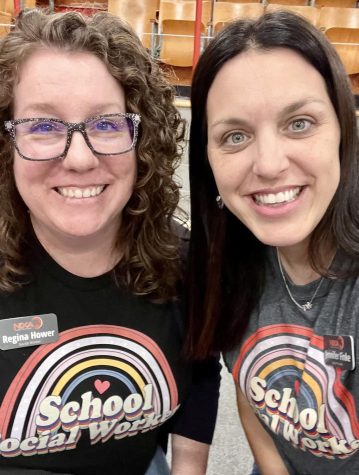Meet Jenn and Regina
Social workers are available to help students in Nixa
March 8, 2023

School social workers wear many hats. Whether it be crisis intervention or simply lending an ear, they are available to help. Within the Nixa school district, social workers Jennifer Finke and Regina Hower are filling this crucial role. Finke and Hower are both licensed clinical social workers, meaning they are licensed therapists and have received the highest level of licensure. Although their home base is the high school, Finke and Hower travel across the district to assist students.
“We are district-wide, so for us [a day] could start out at any one of the buildings,” Finke said. “A normal day would start out [at the high school], and really it entails us following up on cases that we’ve been given. A lot of it’s resource linking, or there’s a family in need, so we contact the family and we talk to them and see kind of what they’re needing or what they’re requesting.”
A large part of Finke and Hower’s work is helping students navigate mental health issues.
“If a student’s having suicidal ideation or struggling with anxiety and depression, we try to problem solve and just talk about coping skills,” Finke said. “If it’s something outside of what we can provide, we’ll refer them to a counselor, like an outside therapist.”
Other aspects of the social workers’ jobs includes reintegrating students into school who were hospitalized or on long-term suspension. They also collaborate with community agencies to provide assistance. Finke said their main goal is to advocate for students and families.
“[We] provide another layer of support,” Finke said. “Those cases that are pretty complicated or really layered, we do a lot of the family piece of it. … [We] are that voice to kind of advocate back to the school and say, hey, this is what they need.”
When dealing with an issue, it may be difficult for a student to know who to see, between the counselors and the social workers. The social workers’ role is different from a counselor role.
“We don’t do anything with academics,” Hower said. “If you’re having a problem with school, we will give you ideas or tools on how to get back on track, but we can’t schedule, we can’t change classes, we don’t do anything like that. We just listen, so we aren’t academic counselors, we’re just mental health.”
No matter what a student is dealing with, the social workers are available to help either directly or by referral. Because they work district-wide, they are not always in their office, but Finke and Hower said they welcome anyone to visit their office.
“Anybody can knock on our door at any time, and we always open the door [and] talk if we’re here,” Hower said. “We have snacks, we let people be comfortable.”
When the counselors are pressed with class scheduling, Finke and Hower hold office hours for students needing to talk. If a student wants to meet with the social workers, it is preferred that they email them first to let them know. It is also a good idea to communicate with their teacher where they are headed.
“… We believe in the dignity, worth [and] value of every person,” Hower said. “It doesn’t matter what color you are, what size you are, what gender you are, it doesn’t matter. … We have unconditional positive regard for all people.”
Although speaking to a social worker may sound intimidating, Finke and Hower work to make sure that the experience is as comfortable as possible.
“… [Our office is] non-judgemental and welcoming,” Hower said. “… [It is] just a place to be calm. … You could expect that you can be yourself and we will meet you where you’re at.”
The social workers’ office is a place of calm, but it is also a safe space to express big emotions.
“Sometimes people come in sobbing and other times people like to shout, so it’s just a way for people to vocalize how they’re feeling and that’s fine,” Finke said. “… Everything that you say to us in this room is confidential. … Very rarely do we ever break confidentiality, but you will know if we have to break it.”
Finke said that they will never question a student’s feelings or give unwanted advice.
“… We truly feel like you’re an expert of yourself,” Finke said. “We’ll ask you questions, but it’s not like investigative, it’s just truly to figure out where you’re at.”
Although social work can be challenging in many ways, Finke and Hower both say they find their jobs rewarding.
“Social work is more than a career, it’s just a way of life,” Hower said. “… I believe in social work, and I believe that people need help and they need somebody to be easy with them.”





